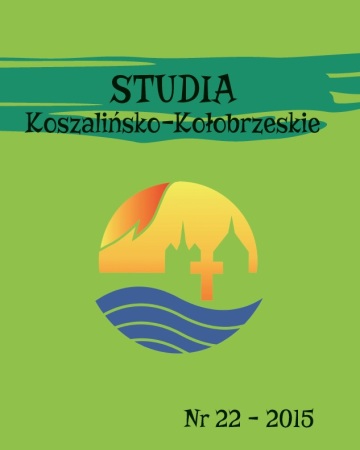
ISSN: 1230-0780
eISSN: 2719-4337
OAI
DOI: 10.18276/skk.2015.22-16





Issue archive /
nr 22 2015
Geneza i przegląd psychologicznych koncepcji mądrości
(The genesis and review of the psychological concept of wisdom)
| Authors: |
Adam
Falewicz
doktorant Katolickiego Uniwersytetu Lubelskiego im. Jana Pawła II, Instytut Psychologii |
| Keywords: | wisdom psychology personal resources coping |
| Data publikacji całości: | 2015 |
| Page range: | 12 (243-254) |
Abstract
This article is an attempt to show the sources and ways of understanding wisdom in the field of psychology. Firstly wisdom is depicted as a phenomenon that has got its source and a specificway of understanding in the philosophy and theology. Subsequently paper presents a history of the development of the concept of wisdom in psychology. Next part refers to selected conceptsof wisdom proposed by leading authors such as Sternberg, Baltes and Labouvie-Vief. This background allows to present Ardelt’s Three Dimensional Wisdom Theory in which wisdom is a understood as a combination of cognitive, reflective and emotional (compassionate) components.
Download file
Article file
Bibliography
| 1. | Ardelt M., Antecedents and effects of wisdom in old age: A longitudinal perspective on aging well, „Research on Aging” 22(2000), nr 4, s. 360-394. |
| 2. | Ardelt M., Are older adults wiser than college students? A comparison of two age cohorts, „Journal of Adult Development” 17(2010), nr 4, s. 193-207. |
| 3. | Ardelt M., Empirical assessment of a three-dimensional wisdom scale, „Research on Aging” 25(2003), nr 3, s. 275-324. |
| 4. | Ardelt M., How Wise People Cope with Crises and Obstacles in Life, „Revision” 28(2005), nr 1, s. 7-19. |
| 5. | Ardelt M., Intellectual versus wisdom-related knowledge: The case for a different kind of learning in the later years of life, „Educational Gerontology” 26(2000), s. 771-789. |
| 6. | Baehr J., Two Types of Wisdom, „Acta Analytica” 27(2012), s. 81-97. |
| 7. | Baltes P.B., Smith J., The Fascination of Wisdom: Its Nature, Ontogeny, and Function, „Perspectives on Psychological Science” 3(2008), nr 1, s. 56-64. |
| 8. | Baltes P.B., Staudinger U.M., The Search for a Psychology of Wisdom, „Current Directions in Psychological Science” 2(1993), nr 3, s. 75-80. |
| 9. | Baltes P.B., Wisdom as orchestration of mind and virtue, 2004, http://library.mpibberlin.mpg. de/ft/pb/PB_Wisdom_2004.pdf. |
| 10. | Barucq A., Grelot P., Mądrość, w: Słownik teologii biblijnej, red. X. Leon-Dufour, Poznań, s. 459-465. |
| 11. | Bergsma A., Ardelt M., Self-reported wisdom and happiness: An empirical investigation, „Journal of Happiness Studies” 13(2012) nr 3, s. 481-499. |
| 12. | Dunkel C.S., Sefcek J.A., Eriksonian Lifespan Theory and Life History Theory: An Integration Using the Example of Identity Formation, „Review of General Psychology” 13(2009), nr 1, s. 13-23. |
| 13. | Falewicz A. Mądrość i prężność a strategie radzenia sobie z codziennymi wydarzeniami w średniej i późnej dorosłości. Niepublikowana praca magisterska. Lublin 2014. |
| 14. | Gaukroger S., The emergence of a scientific culture: Science and the shaping of modernity 1210-1685, Oxford 2006. |
| 15. | Gluck J., Bluck S., Baron J., The wisdom of experience: autobiographical narratives across adulthood, „International Journal of Behavioral Development” 29(2005), nr 3, s. 197-208. |
| 16. | Gugerell S.H., Riffert F., On Defining “Wisdom”: Baltes, Ardelt, Ryan, and Whitehead, „Interchange” 42(2011), nr 3, s. 225-259. |
| 17. | Harwas-Napierała B., Trempała J., Psychologia rozwoju człowieka. Tom 2. Charakterystyka okresów życia człowieka, Warszawa 2009. |
| 18. | Kapuściński R., Wiersze zebrane, Warszawa 2008. |
| 19. | Nussbaum J.F., The Communication of Wisdom: The Nature and Impact of Communication and Language Change Across the Life Span, „Journal of Language and Social Psychology” 32(2012), nr 3, s. 243-260. |
| 20. | Sękowski A., Osiągnięcia uczniów zdolnych, Lublin 2000. |
| 21. | Sękowski A., Psychologia zdolności. Współczesne kierunki badań, Warszawa 2004. |
| 22. | Staudinger U.M., A psychology of wisdom: History and recent developments, „Research In Human Development” 5(2008), nr 2, s. 107-120. |
| 23. | Sternberg, R.J., Why Schools Should Teach for Wisdom: The Balance Theory of Wisdom in Educational Settings, „Educational Psychologist” 36(2001), nr 4, s. 227-245. |
| 24. | Steuden S., Z rozważań nad mądrością, w: Dalej w tę samą stronę, red. I. Ulfik-Jaworska, A. Gała, Lublin 2012, s. 533-548. |
| 25. | Takahashi M., Overton W.F., Wisdom: A culturally inclusive developmental perspective. „International Journal of Behavioral Development” 26(2002), nr 3, s. 269-277. |
| 26. | Trowbridge R.H. Waiting for Sophia: 30 Years of Conceptualizing Wisdom in Empirical Psychology, „Research in Human Development” 8(2011), nr 2, s. 149-164. |
| 27. | Trowbridge R.H., Ferrari M., Sophia and Phronesis in Psychology, Philosophy, and Traditional Wisdom, „Research in Human Development” 8(2011), nr 2, s. 89-94. |
| 28. | Yang S.Y., A process view of wisdom. „Journal of Adult Development” 15(2008), s. 62-75. |